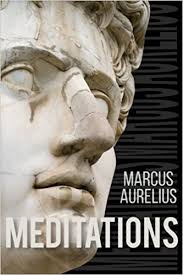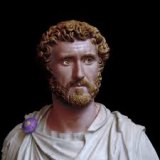Meditations Page #12
Meditations is a series of personal writings by Marcus Aurelius, Roman Emperor from 161 to 180 AD, recording his private notes to himself and ideas on Stoic philosophy. Marcus Aurelius wrote the 12 books of the Meditations in Koine Greek as a source for his own guidance and self-improvement.
XI. To these ever-present helps and mementoes, let one more be added, ever to make a particular description and delineation as it were of every object that presents itself to thy mind, that thou mayest wholly and throughly contemplate it, in its own proper nature, bare and naked; wholly, and severally; divided into its several parts and quarters: and then by thyself in thy mind, to call both it, and those things of which it doth consist, and in which it shall be resolved, by their own proper true names, and appellations. For there is nothing so effectual to beget true magnanimity, as to be able truly and methodically to examine and consider all things that happen in this life, and so to penetrate into their natures, that at the same time, this also may concur in our apprehensions: what is the true use of it? and what is the true nature of this universe, to which it is useful? how much in regard of the universe may it be esteemed? how much in regard of man, a citizen of the supreme city, of which all other cities in the world are as it were but houses and families? XII. What is this, that now my fancy is set upon? of what things doth it consist? how long can it last? which of all the virtues is the proper virtue for this present use? as whether meekness, fortitude, truth, faith, sincerity, contentation, or any of the rest? Of everything therefore thou must use thyself to say, This immediately comes from God, this by that fatal connection, and concatenation of things, or (which almost comes to one) by some coincidental casualty. And as for this, it proceeds from my neighbour, my kinsman, my fellow: through his ignorance indeed, because he knows not what is truly natural unto him: but I know it, and therefore carry myself towards him according to the natural law of fellowship; that is kindly, and justly. As for those things that of themselves are altogether indifferent, as in my best judgment I conceive everything to deserve more or less, so I carry myself towards it. XIII. If thou shalt intend that which is present, following the rule of right and reason carefully, solidly, meekly, and shalt not intermix any other businesses, but shall study this only to preserve thy spirit unpolluted, and pure, and shall cleave unto him without either hope or fear of anything, in all things that thou shalt either do or speak, contenting thyself with heroical truth, thou shalt live happily; and from this, there is no man that can hinder thee. XIV. As physicians and chirurgeons have always their instruments ready at hand for all sudden cures; so have thou always thy dogmata in a readiness for the knowledge of things, both divine and human: and whatsoever thou dost, even in the smallest things that thou dost, thou must ever remember that mutual relation, and connection that is between these two things divine, and things human. For without relation unto God, thou shalt never speed in any worldly actions; nor on the other side in any divine, without some respect had to things human. XV. Be not deceived; for thou shalt never live to read thy moral commentaries, nor the acts of the famous Romans and Grecians; nor those excerpta from several books; all which thou hadst provided and laid up for thyself against thine old age. Hasten therefore to an end, and giving over all vain hopes, help thyself in time if thou carest for thyself, as thou oughtest to do. XVI. To steal, to sow, to buy, to be at rest, to see what is to be done (which is not seen by the eyes, but by another kind of sight:) what these words mean, and how many ways to be understood, they do not understand. The body, the soul, the understanding. As the senses naturally belong to the body, and the desires and affections to the soul, so do the dogmata to the understanding. XVII. To be capable of fancies and imaginations, is common to man and beast. To be violently drawn and moved by the lusts and desires of the soul, is proper to wild beasts and monsters, such as Phalaris and Nero were. To follow reason for ordinary duties and actions is common to them also, who believe not that there be any gods, and for their advantage would make no conscience to betray their own country; and who when once the doors be shut upon them, dare do anything. If therefore all things else be common to these likewise, it follows, that for a man to like and embrace all things that happen and are destinated unto him, and not to trouble and molest that spirit which is seated in the temple of his own breast, with a multitude of vain fancies and imaginations, but to keep him propitious and to obey him as a god, never either speaking anything contrary to truth, or doing anything contrary to justice, is the only true property of a good man. And such a one, though no man should believe that he liveth as he doth, either sincerely and conscionably, or cheerful and contentedly; yet is he neither with any man at all angry for it, nor diverted by it from the way that leadeth to the end of his life, through which a man must pass pure, ever ready to depart, and willing of himself without any compulsion to fit and accommodate himself to his proper lot and portion. THE FOURTH BOOK I. That inward mistress part of man if it be in its own true natural temper, is towards all worldly chances and events ever so disposed and affected, that it will easily turn and apply itself to that which may be, and is within its own power to compass, when that cannot be which at first it intended. For it never doth absolutely addict and apply itself to any one object, but whatsoever it is that it doth now intend and prosecute, it doth prosecute it with exception and reservation; so that whatsoever it is that falls out contrary to its first intentions, even that afterwards it makes its proper object. Even as the fire when it prevails upon those things that are in his way; by which things indeed a little fire would have been quenched, but a great fire doth soon turn to its own nature, and so consume whatsoever comes in his way: yea by those very things it is made greater and greater. II. Let nothing be done rashly, and at random, but all things according to the most exact and perfect rules of art.
Translation
Translate and read this book in other languages:
Select another language:
- - Select -
- 简体中文 (Chinese - Simplified)
- 繁體中文 (Chinese - Traditional)
- Español (Spanish)
- Esperanto (Esperanto)
- 日本語 (Japanese)
- Português (Portuguese)
- Deutsch (German)
- العربية (Arabic)
- Français (French)
- Русский (Russian)
- ಕನ್ನಡ (Kannada)
- 한국어 (Korean)
- עברית (Hebrew)
- Gaeilge (Irish)
- Українська (Ukrainian)
- اردو (Urdu)
- Magyar (Hungarian)
- मानक हिन्दी (Hindi)
- Indonesia (Indonesian)
- Italiano (Italian)
- தமிழ் (Tamil)
- Türkçe (Turkish)
- తెలుగు (Telugu)
- ภาษาไทย (Thai)
- Tiếng Việt (Vietnamese)
- Čeština (Czech)
- Polski (Polish)
- Bahasa Indonesia (Indonesian)
- Românește (Romanian)
- Nederlands (Dutch)
- Ελληνικά (Greek)
- Latinum (Latin)
- Svenska (Swedish)
- Dansk (Danish)
- Suomi (Finnish)
- فارسی (Persian)
- ייִדיש (Yiddish)
- հայերեն (Armenian)
- Norsk (Norwegian)
- English (English)
Citation
Use the citation below to add this book to your bibliography:
Style:MLAChicagoAPA
"Meditations Books." Literature.com. STANDS4 LLC, 2025. Web. 24 Feb. 2025. <https://www.literature.com/book/meditations_76>.








Discuss this Meditations book with the community:
Report Comment
We're doing our best to make sure our content is useful, accurate and safe.
If by any chance you spot an inappropriate comment while navigating through our website please use this form to let us know, and we'll take care of it shortly.
Attachment
You need to be logged in to favorite.
Log In